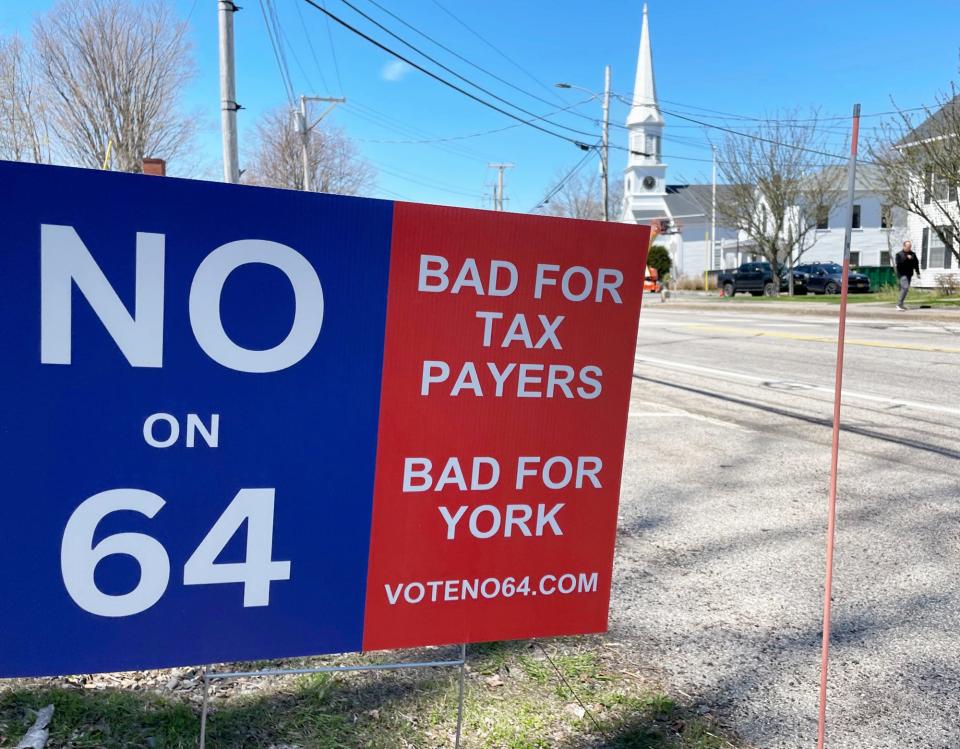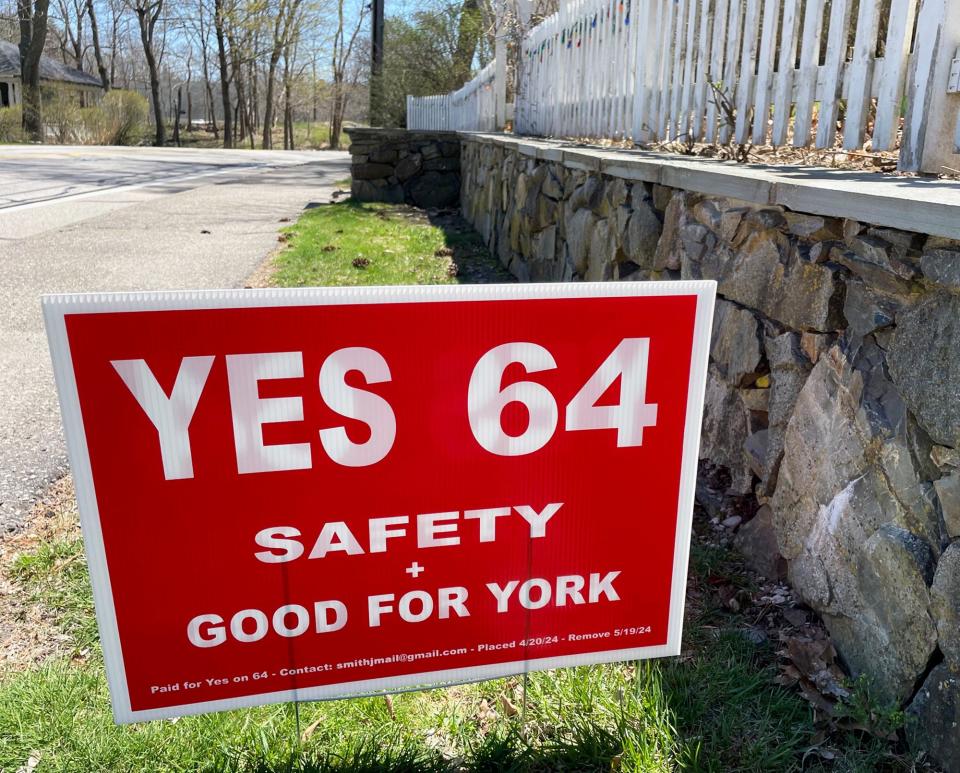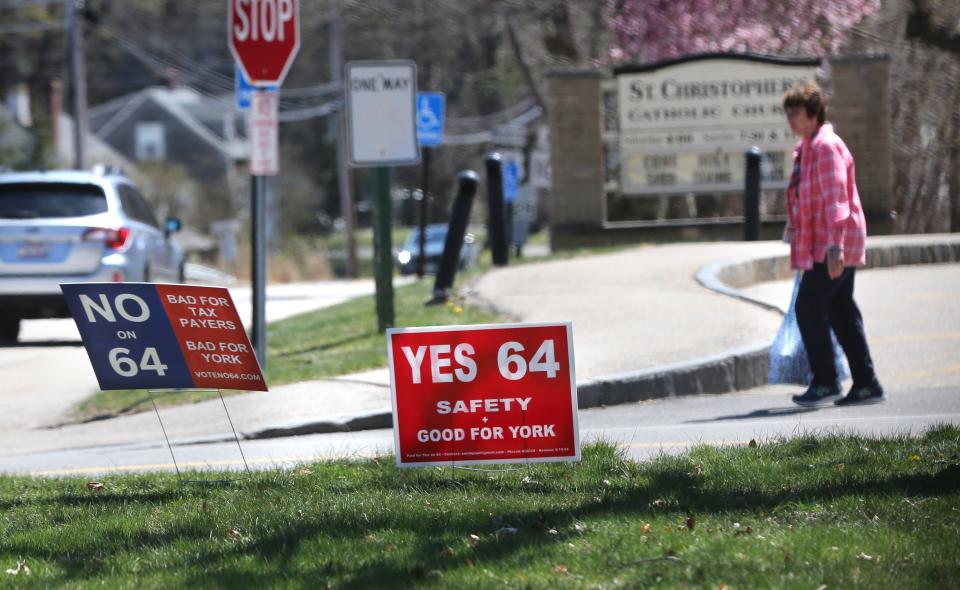York divided? Short-term rental ordinance regulating Airbnbs sparks dueling campaigns
YORK, Maine — Signs have popped up along Route 1, York Village and other parts of town calling attention to a proposed short-term rental ordinance on the May referendum ballot.
One sign colored blue and red asks residents to “Vote no on 64” as part of a campaign against the ordinance regulating short-term rentals for the first time in the town of York. Owners of short-term rentals like those advertised on sites like Airbnb say the new ordinance is a government overreach where rentals have already existed in town for more than 100 years.
“Bad for taxpayers,” read the signs, as well as “Bad for York.”

Also posted around town are red and white signs asking voters to pass the ordinance. The ordinance would require registration of short-term rentals with the town and safety inspections and prohibit activities including fire pits.
“Yes 64,” the red signs read with the words “safety” and “Good for York.”

The group of short-term rental operators behind the “no” campaign have been calling on the Selectboard to forego putting an ordinance before voters since talks began last year. They say property owners’ rights will be ignored as the town looks to inspect and regulate residential homes used for vacation stays.
“There’s always acceptable ordinances,” said Realtor Greg Gosselin, who is part of the group that is behind the “Vote no on 64” campaign. “What they’ve got is not acceptable.”
Residents like Barry Waddell, who lives in the York Harbor section of town, say the time has come for an ordinance that regulates rentals that he says have become more common in his neighborhood in the last several years. He said he grew up in York and has recently found many single-family houses around his family home had been converted into “party houses” that changed the neighborhood.
“This 100-year argument doesn’t cut it for me,” Waddell said. “Today we have more ordinances about dog ownership than we do about running a 26-person, three-story, 10-plus car mini hotel next to a single-family home.”
Southern charm on northern roads: Tennessee transplant opens mobile auto repair shop
Rental owners: New ordinance infringes on property rights
Article 64, going to voters on the May 18 referendum ballot at York High School, would require owners of short-term rentals to undergo an inspection every three years. It would also set limits for occupancy to prevent rentals from becoming overcrowded.
Short-term rental owners would be charged a permit fee. Selectboard members have suggested it be around $350 for three years, which they said would cover the “hard costs” of implementing the ordinance.
Owners of short-term rentals have spoken against the ordinance since its first draft was crafted last winter. The board has been considering the ordinance after receiving complaints about party houses in the York Harbor area last year.

Some owners and proponents of the rental industry have since collaborated on campaigning against the proposed ordinance. Sean McKeon said he heard about the ordinance in January and said the news came “very suddenly.”
McKeon described himself as a “mom and pop” size renter who has strong relationships with guests who have come to stay at their property in York year after year. He said hearing the Selectboard talk about the ordinance this winter and spring gave him the impression the board was cracking down on the rentals.
“It almost felt like we were doing something wrong,” Mckeon said.
McKeon has since collaborated with Gosselin and renters like Joe Colwell, who also believes the ordinance is an overreach of power. McKeon said he created the website, www.voteno64.com, that outlines their position.
The site includes a list of arguments against the ordinance, which states it was “rushed, not supported by data, and will have a negative impact on York taxpayers and our community.” It argues taxpayers will be burdened with increased costs for code enforcement and fire department services as they perform inspections.
The site also alleges the ordinance “weaponizes neighbor against neighbor” and will have a negative impact on the local economy. It notes that many homes have been owned for generations and many people will be unable to afford to upgrade their homes to keep up with “onerous regulations” that could make them ineligible to obtain a permit.
Opponents of the ordinance say the town should take more time to study the issue, saying it’s a goal of the town’s Comprehensive Plan. Gosselin said the ordinance, as proposed, impacts many longtime York families dedicated to the town.
“These are not people that are just from away,” Gosselin said. “This is about property rights from my perspective.”
York Selectboard race: Allen challenges incumbents in wake of husband's death
Residents in York Harbor say they want the ordinance
Homeowners supportive of the ordinance say they have a problem with some of the messaging from the “No on 64” campaign. For one, Jim Smith, who lives in York Harbor, said opponents of the ordinance have misrepresented the rental owners as something other than a business. He contends that even “mom and pop” cottage rentals that have been there for years are still businesses and need to be regulated.
“It’s a business. License it as a business,” Smith said. “You have to have a permit to go to the transfer station.”
Smith and Waddell contend activities prohibited in the ordinance, like fire pits, are important restrictions despite pushback from rental owners. The website www.voteno64.com says that York is the only town in Maine prohibiting firepits for short-term rentals.
Waddell said the burning is a central part of their complaint about the impact of rentals on their neighborhoods, along with the loud activity.
“I can no longer sit on my front porch many nights at night in the summer because of smoke inhalation from a firepit and noise from 26 people and 10-plus cars,” Waddell said.
Kirk Minnick said he moved to York Harbor and York Beach in 2018 and is concerned about the growth of short-term rentals coming to his neighborhood. He said he researched what other communities have implemented for rental ordinances and found York’s proposal is, in some ways, less restrictive.
Some towns have a cap on the number of rentals that can be licensed. Bangor has a cap on non-owner occupied short-term rentals that limits the number to 1% of the city’s housing stock. Kennebunkport authorizes the Board of Selectmen to set a limit annually using a certain formula.
Meanwhile, Minnick points out that York has no cap proposed in its ordinance nor limitations on where the rentals can go.
“There are many that are more restrictive,” Minnick said. “I really think it’s a balanced approach.”
York officials prepare for May referendum vote
With residents divided over whether to pass the ordinance, members of the Selectboard are also on opposing sides. The board voted 4-1 to send the ordinance to the ballot earlier this year, and board member Mike Estes still believes more time should have been spent studying how to regulate the rentals.
Estes said many amendments made in the board’s last work session were proposed by him to make the ordinance more palatable for rental owners. He said he even proposed including the ban on wood fires that had caused complaints from residents.
Still, he said he has concerns about the impact the ordinance will have on homes built before modern code standards were created.
“It’s going to create all kinds of problems,” Estes said. “You’re talking about housing stocks that were built 200 years ago versus what was built this year. The difference in codes through those times are going to be so different.”
Selectboard Chair Todd Frederick believes the ordinance is ready to be passed in May. He disagreed with rental owners who have said the process was rushed, saying conversations about this go back at least 10 years.
“We felt that it was time to take a look at some form of regulation for Airbnb or vacation rental properties in town,” Frederick said. “I hope the voters will support the ordinance.”
This article originally appeared on Portsmouth Herald: York’s short-term rental ordinance ignites dueling campaigns
